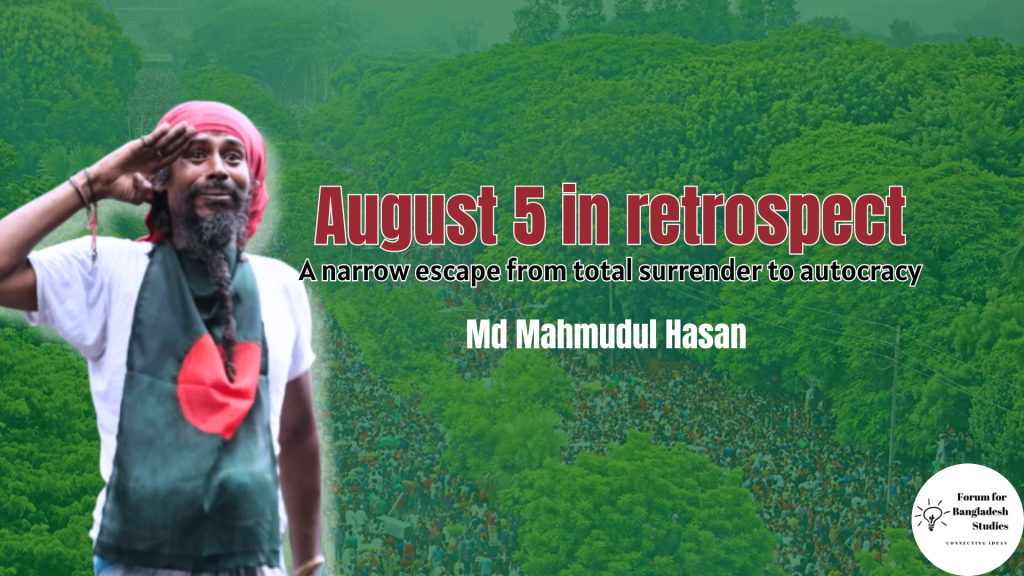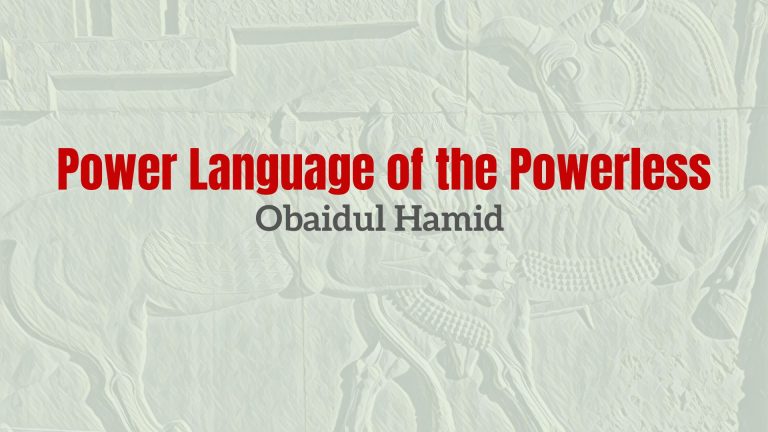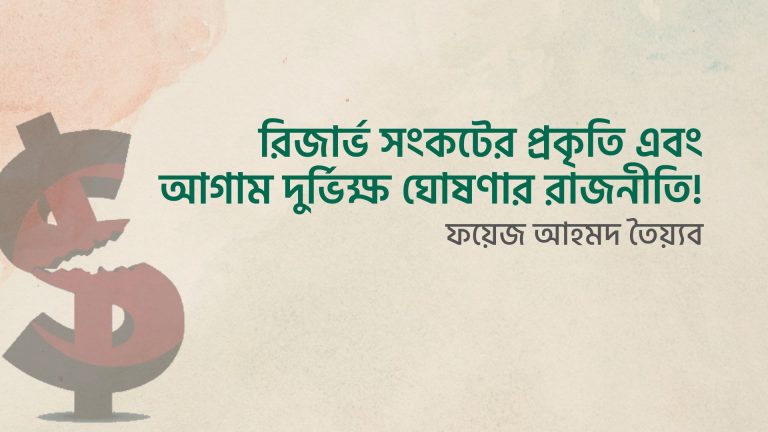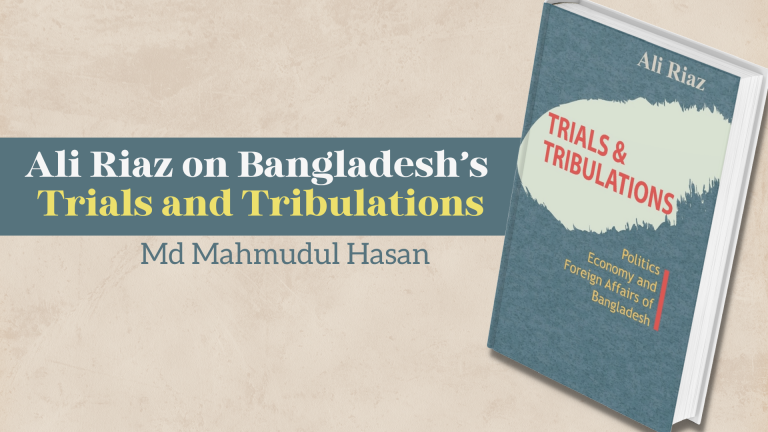I HAVE lived outside Bangladesh for roughly two decades. Over the years, I have met people from many parts of the world with different backgrounds. For more than a decade I have been teaching at International Islamic University Malaysia that has academics and students from about one hundred countries. When meeting people from countries under autocratic rule, I have seen terrified and trembling faces and heard stories of deceit, cruelty, violence and bondage.
One day, one of my international students came to my office for consultation. After giving them advice on matters relating to their education, I asked them about human rights situations in their country. I anticipated hearing a verbal reply, but I was struck by their silence. Although the student didn’t utter a single word, I got my answer. Holding back their tears, they then managed to explain in brief how life was in their country.
The student told me that their fathers, brothers and other male relatives had been drifting in and out of prison for no crime. The stressful existence of those men outside jail is no less horrifying than their life behind bars. Often, they have to remain in hiding — away from home — for days, weeks and months, leaving vulnerable women and children alone. They are not perceived as supporters of the autocratic government of their country, and that was enough for the police or ruling party thugs to hound them.
On another occasion, I was talking with another international student from a different country which is also under tyrannical rule. They had graduated from International Islamic University Malaysia a long time ago and came back to Malaysia for further education. Their decision to return to Malaysia seemed to be for both education and security reasons. They found life back home intolerable.
I had some idea about their country, as it was often in the news. But I wanted to hear from the horse’s mouth. So, in my characteristic style, I asked them how life was in their country. A deep sigh of anguish and sadness followed. A great burden of anxiety and disappointment rippled through their expression, as they tried hard to remain composed. They stared straight, as their eyes were filled with gloom. After collecting themselves, they said that peace remained elusive in their country, as persecution was rampant.
‘Why,’ I asked.
There must have been a long list of reasons why they experienced economic and political difficulties back home, but they chose to share an innocuous one.
They replied, ‘Living costs have gone through the roof and competition in the job market has been increasingly fierce.’ The conversation became delicate and difficult to navigate. It had an abrupt end.
Their country is resourceful and hence there was no reason for prices of basic commodities to shoot up. Citizens knew well how their country was being robbed by inept and corrupt rulers but were unable to raise their voices in protest. Public protests were banned in their country, and even a hint of dissent was met with imprisonment or execution.
What I learnt from my exchanges with people from various countries is that citizens under repressive regimes live in slavery-like conditions.
In the past when I heard stories of sufferings under autocratic rule, I had a sense of complacency as I thought that I understood them. But I was wrong.
The myriad dimensions of victimhood under totalitarianism became clearer to me when electoral democracy in Bangladesh was sent into exile and Hasina’s autocracy finally held absolute sway over its 170 million people.
We came to understand the full extent of the wretchedness that citizens endure under a despotic system. We saw how people belonging to opposition parties were tortured and killed by security forces or by rampaging thugs of Hasina’s ruling party.
But how about the rest of us who are not involved in party politics? Were we spared the wrath of Hasina’s totalitarianism? Weren’t we shocked by the agony of seeing our country drifting into a horror-filled land? Weren’t we gripped by fear and uncertainty and unable to break free from the juggernaut of a narcissistic regime? Weren’t many Bangladeshis forced to pretend to love the ruling party even though they were full of resentment and bitterness against the regime?
Is it all over? Aren’t we still affected by the economic misfortune caused by massive corruption and capital flight on Hasina’s watch?
In short, we were on the verge of despair when Hasina’s 15-year rule bore all the hallmarks of totalitarianism. Except for a privileged few belonging to the ruling party and the government, most Bangladeshis — including ordinary Awami League affiliates — were forced to surrender to Hasina’s autocracy.
We had no clue how to achieve liberation from the morass of fear until our young people rallied around the anti-discrimination student movement. They took to the streets en masse in countrywide protests. Initially, we in Bangladesh and in its diasporas made different predictions about the outcome of the student movement. Given Hasina’s mounting record of repression against dissent voices, we were very worried about the safety of our young people.
With the connivance of security forces, Hasina had managed to squash the first wave of student-led protests. What we now know is that from 16 July until she resigned and left our country on August 5, 2024, her security forces and party men killed about one thousand young people through shootings in broad daylight. At one point, she emerged as victorious and was under the illusion that everything was under control.
In an apparent move to embolden her, foreign envoys were lining up to meet her. On July 31, 2024 one envoy of a South Asian country and on August 1, 2024 another of a European nation called on Hasina at Gono Bhaban. Both praised her for restoring normalcy and stability in the country.
I don’t think those diplomats were unaware that, translated in real terms, normalcy meant mass slaughter of our young people and the maiming of thousands of them. We saw in utter helplessness teenage students handcuffed and humiliated and girls hounded and crammed into police vans. Students were arrested from campuses, streets and their houses.
Then came the second wave of the revolution on August 5, 2024. The police used force again on that morning, but our brave and valiant youths conquered the fear of death. They refused to surrender to Hasina’s autocracy. She fell and fled early in the afternoon.
Had things turned out differently on that day and Hasina managed to cling to power by spilling more blood on the streets, our fate would have been sealed for a very long time. More foreign envoys would have gone to Gono Bhaban to congratulate her and to take advantage of our country in all possible ways. She would have removed all guardrails, and we would have forgotten our dreams of freedom for a foreseeable future. Hasina’s autocracy would have gained normalcy, and a section of our intellectual elites would have continued to give her epistemic cover-ups.
Freedom is not free. We should never forget that our students and young people have paid for it with pools of blood. Our country occupies a small area in the world map, but has a large population. It was a price worth paying for the freedom of all Bangladeshis.
Originally Published: New Age, 27 August, 2024




